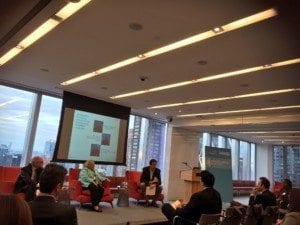Data that moves compliance from department of ‘no’ to valued partner in the know

Compliance officers have spent a large part of their careers convincing the workforce and senior executives that they should not be feared. While trying to dissect and prioritize an endless onslaught of government enforcement priorities coupled with other tasks such as monitoring risks associated to an ever-changing employee base and mounting business pressures, they continue to struggle with policing and building trust with business leaders. But a critical shift is on the horizon, according to experts.
“There is a confluence of factors shaping the role of Compliance Officers which includes trying to convince the business that they are our partners,” says Jay Cohen, Senior Vice President and Chief Compliance Officer, Assurant, at a recent Compliance Tech Talk Forum in New York City. “I think it’s time for a shift, we also need to convince the CEO and other parts of the business that there will be times where we should act as obstacles, where we should serve as the dreaded sales prevention points. We need to have those conversations now so that they understand when Compliance Officers object we are doing it because we have the best interest of the organization at heart.”
The forum hosted by Convercent and Ethisphere brought together General Counsels, Chief Compliance Officers, and business side leaders at the international law firm Morrison Foerster’s New York City office to engage in an interactive dialogue on cutting-edge data, compliance, case studies and new approaches to company culture.
The speakers stressed that creating a data-driven culture that “goes beyond the basics” can help Compliance Officers frame the conversation through the use of powerful business information and data analytics. “We focus our data on an impact or trend of an issue and use the information gathered as a narrative to show and prove the effectiveness of a Compliance program,” says Katie Smith, Executive Vice President and Chief Compliance officer, Convercent. “Data also allows us to talk about the investigation process and make predictions to better address risks.”
Cohen added that through collaborating with employees on the data analytics side of the business, compliance is able to identify who a product is being sold to, the price and why customers are canceling a policy. “Maybe there’s something about how that policy is being sold that we should investigate,” said Cohen. “We can leverage this information to spot potential compliance issues and this business data can help to move the needle in this field.”
The FCPA Pilot Program: When Self-Disclosure is the Way to Go
There’s widespread belief among compliance practitioners that a company may not benefit at all by having reported a violation and, in some instances, it is in fact worse off. In another session at the forum, Ruti Smithline, Partner, Morrison & Foerster, explored the Department of Justice (DoJ) FCPA Pilot Program, a yearlong initiative to help drive transparency and accountability in FCPA investigations. “According to the FCPA Pilot Program, the DoJ may give you up to 50 percent of the reduction of the sentencing guidelines (note: it does not say it ‘will’) and it may consider not imposing a monitor—kind of an illusionary promise if you ask outside counsel,” said Smithline.
She went on to explore the difference between voluntary self-disclosure and cooperation and highlighted that if counsel decides to self-disclose, they should keep in mind the facts and circumstances associated with the investigation and DoJ’s view. “Before the pilot program there was not much difference between self-disclosure and cooperating with the DoJ, what the authority is saying now is that if you only cooperate with the investigation and you remediate or don’t disclose you may only get up to 25 percent off—again, it does not give you much certainty.”
Enjoyed reading this recap? Here’s more:
Leading Practices in Corporate Ethics, Culture, Value & Performance
BELA Roundtable: Automation within the Ethics & Compliance Function
Dell: Our Latest Forum on Corporate Ethics, Culture, Value and Performance



